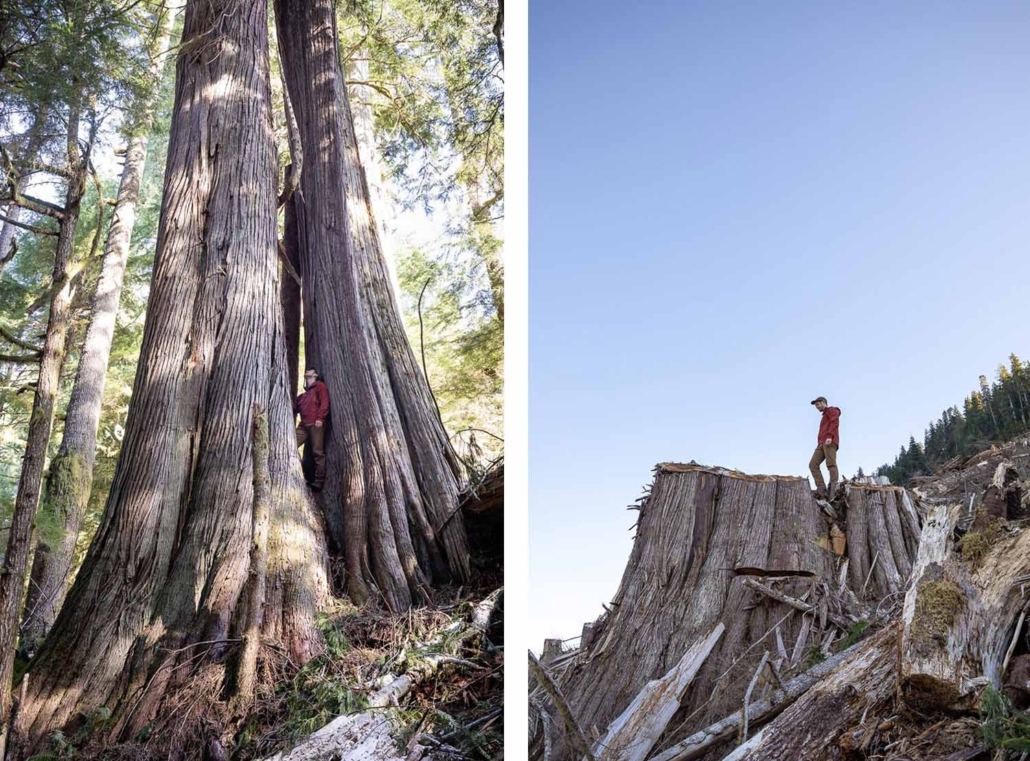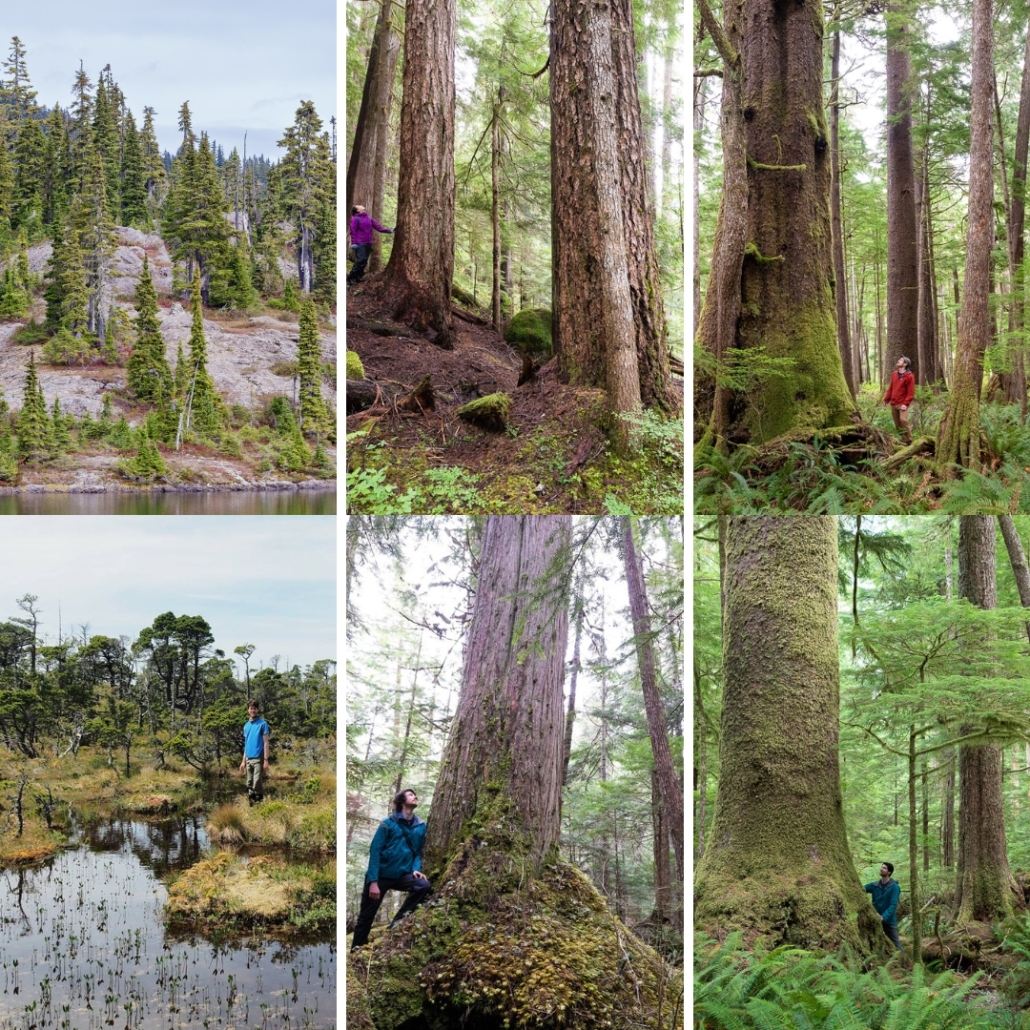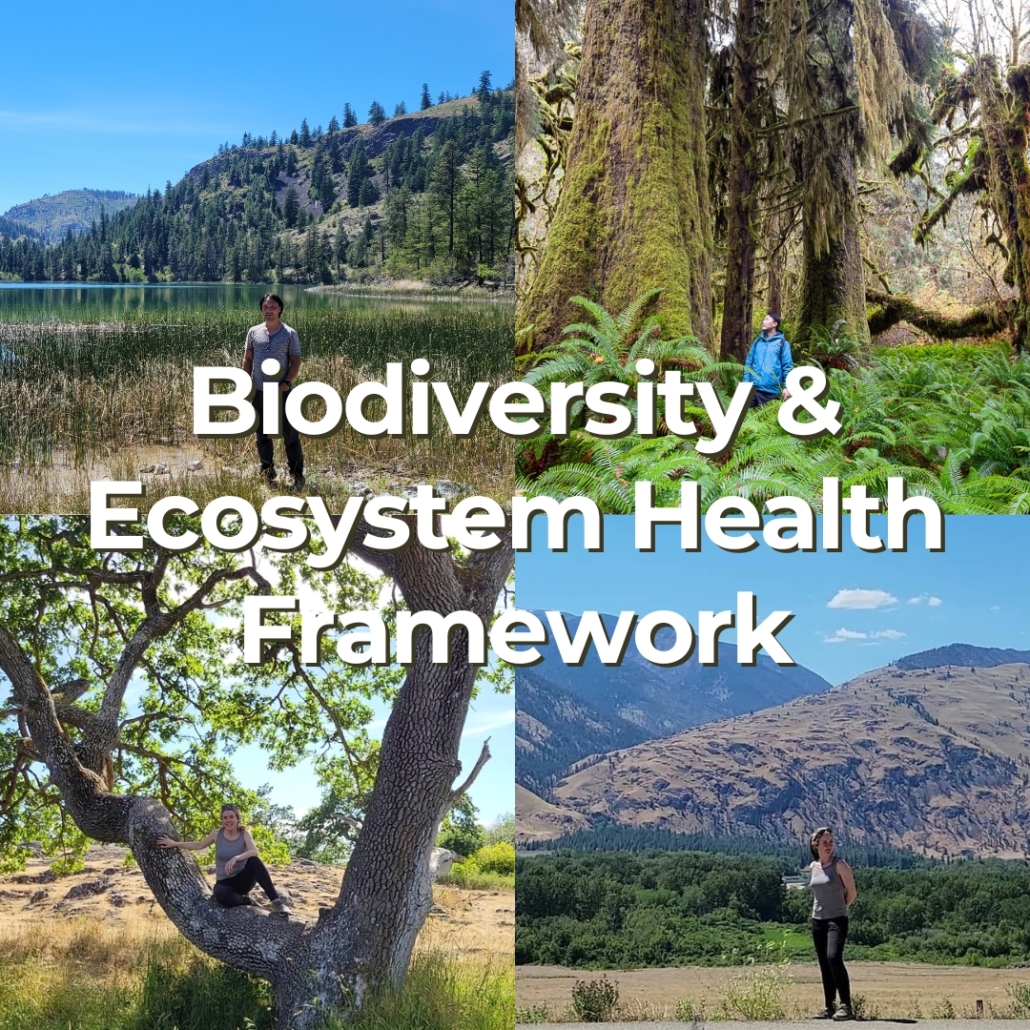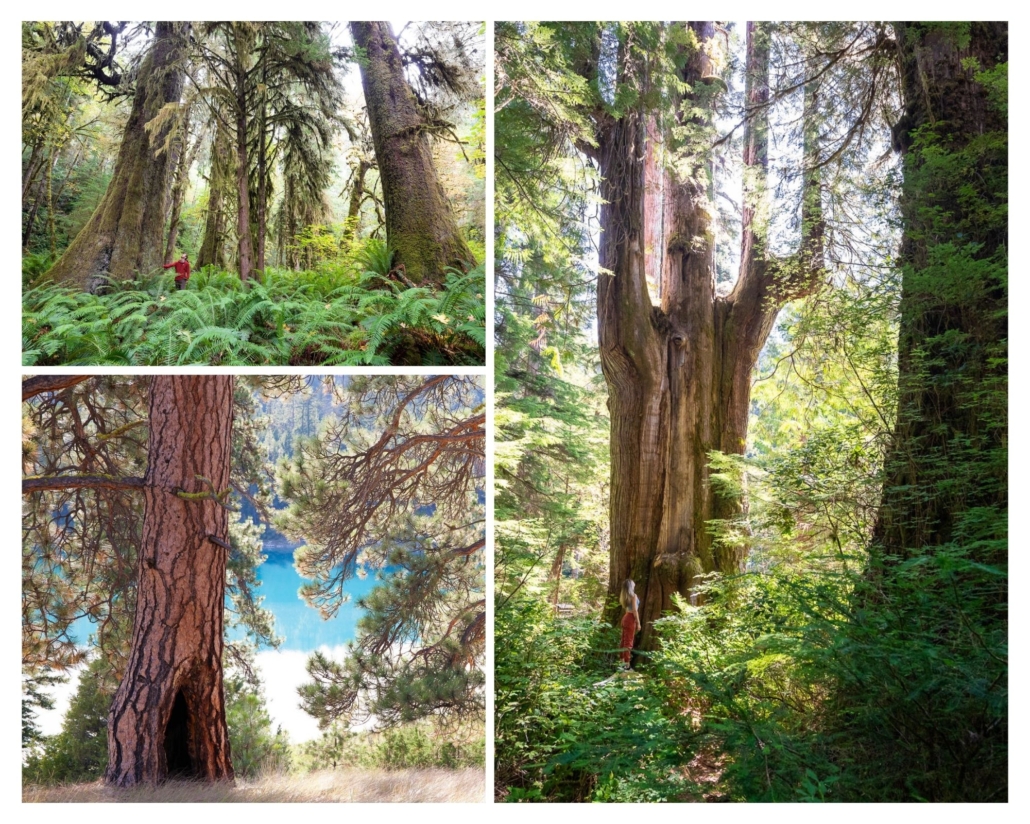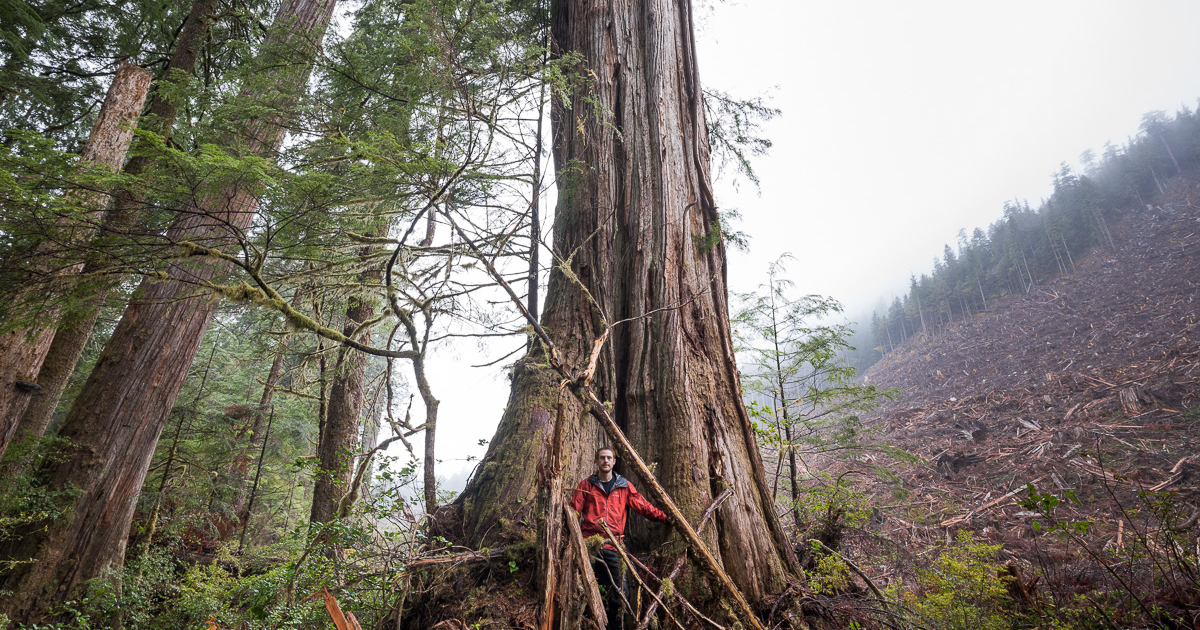 Nov 1 2023
Nov 1 2023ACTION ALERT: Tell your MLA to stand up for old-growth protection and sustainable forestry jobs!
Write, phone, and/or meet with your provincial Member of the Legislative Assembly (MLA) and ask them to support ancient forest protection and sustainable, second-growth forestry.
BC is home to some of the world’s finest remaining old-growth temperate rainforests, where trees growing as wide as a living room and living to be more than a thousand years old are vital pillars in supporting endangered species, First Nations cultures, the climate, clean water, wild salmon, tourism, and more.
After more than a century of logging, however, well over 90% of the most productive, “big-tree” old-growth forests in BC have been cut and much of what remains is still under threat. Currently, only about 15% of the province is safeguarded in legislated protected areas, and endangered old-growth forests continue to be logged on an industrial scale.
Thankfully, after years of enormous pressure from the Ancient Forest Alliance (AFA) and our thousands of supporters, the province, under the leadership of Premier David Eby, has now taken major steps to support the protection of old-growth forests.
These steps include committing to doubling protected areas in BC to 30% by 2030, launching a $300 million conservation financing mechanism to support the creation of new Indigenous Protected and Conserved Areas, and announcing the tripartite BC Nature Agreement which will provide over $1 billion toward protecting 30% of the land base in BC by 2030. This also includes a $100 million BC Old-Growth Fund (set to grow to $164 million with matching funding from the province) specifically to protect the grandest old-growth temperate rainforests in BC!
On the heels of these major funding announcements, the province also released a draft Biodiversity and Ecosystem Health Framework (BEHF) to guide all new protection, conservation, and land-use activities.
These incredible steps did not happen by accident. Tens of thousands of AFA supporters have sent messages to BC government ministers and politicians demanding action. British Columbians from diverse segments of society, including the BC Chamber of Commerce, the Union of BC Municipalities, and the Public and Private Workers of Canada union, have all called on the provincial government to increase the protection of the remaining old-growth forests in BC. We have seen enormous progress, but more needs to be done! There are still major policy and funding gaps that must be addressed to ensure the protection of the most endangered old-growth forests and other ecosystems in BC.
The recent influx of funding provides the resources necessary to preserve old growth but now those funds must be geared toward protecting the most threatened and biodiverse ecosystems. It is still entirely possible, and without dedicated work probable, that these new commitments and funds will mainly support protection in low productivity areas of rock, ice, and small trees, rather than in the productive valley-bottom ecosystem where the giant trees grow. Now we need to push hard for the complete, permanent protection of our threatened old-growth forests while this window of opportunity is open.
If you live in British Columbia, please contact your own Member of the Legislative Assembly (MLA), the elected provincial politician who is supposed to represent YOU. It’s imperative that as your representative, they make it a top priority to protect the most threatened and productive old-growth forests and support sustainable economic development in First Nations communities that can replace old-growth logging. Please write, phone, or meet with your local MLA — or better yet…do all three!
Start by visiting the BC legislature’s website to find your MLA’s name and contact information.
Start by visiting the BC legislature website to find your MLA’s name and contact information.
Important points to include when emailing your MLA:
- Old-growth forests are important for sustaining endangered species, tourism, clean water, wild salmon, and many First Nations cultures.
- As the province moves forward with its 30% x 2030 protection targets, BC must adhere to a science-based, old-growth protection plan that uses ecosystem-based protection targets to permanently safeguard the productive, “big-tree” old-growth forests.
- Conservation financing from the province should be linked to the protection of the most at-risk ecosystems and directed toward First Nations’ sustainable economic development, such as tourism, sustainable second-growth forestry, and renewable energy.
- While long-term land-use plans are developed, the BC government must prioritize enabling temporary logging deferrals in the most endangered old-growth forests identified by its own Technical Advisory Panel (TAP), by providing $120 million in short-term “solutions space” funding to offset any lost revenues First Nations would incur by forgoing logging in at-risk stands.
- Forestry jobs can be sustained and enhanced by restricting raw log exports to keep BC logs for BC’s mills and by providing financial incentives (e.g. tax breaks) to help develop a value-added, second-growth wood manufacturing industry.
- BC must dedicate funding for a provincial Land Acquisition Fund to purchase and protect old-growth forests and endangered ecosystems on private lands.
* Be sure to include your full name and address so that they know you’re a real person!
When PHONING your MLA’s constituency office:
You’ll likely speak to a constituency assistant, so briefly let them know your name, home address (so they know you’re a constituent), and include these points:
- BC needs a science-based Protected Areas Strategy with legally binding targets to protect the full diversity of ecosystems in BC. This should factor in ‘forest productivity distinctions’ to ensure the “big tree” old-growth stands get protected, not just “scrubby” old-growth with smaller trees (think sub-alpine, bog forests) that are less sought after by industry.
- The $1.1 billion in conservation financing now available for First Nations should be linked to the protection of the most threatened old-growth forests. This funding must also support sustainable economic alternatives (i.e. tourism, sustainable seafood, non-timber forest products, etc.) to help supplant the revenues from old-growth logging.
- An additional estimated $120 million is still needed in short-term “solutions space” funding to support First Nation’s-led old-growth logging deferrals. Many nations do not have the economic means to forgo logging over the next few years in the forests with the highest timber values, which are also the most at-risk.
- Lastly, BC needs a dedicated $70 million Land Acquisition Fund to help purchase and protect endangered old-growth forests and areas of high recreational value on private lands.
When MEETING with your MLA:
Request a face-to-face meeting when writing or phoning your MLA. Provide your name and residential address so they know you’re from the Member’s constituency. Before meeting with your MLA, review the background information below and read these talking points, which will help you get prepared. In the meeting, ask them what they will do to help and write down their answer. Be polite, but firm, and listen carefully. If your MLA makes a commitment or shares something noteworthy that you would like to share with us at the Ancient Forest Alliance, email us at info@ancientforestalliance.org. Please feel free to contact us in advance if you need advice on meeting your MLA.
BACKGROUND INFORMATION on Old-Growth Forests in BC
The old-growth forests in BC are among the most magnificent forests on Earth. Home to some of the world’s largest trees, old-growth forests are not only iconic parts of BC, but they also support unique plants, animals, and cultures.
Despite their environmental, cultural, and economic value, these magnificent ancient forests are now highly endangered due to industrial logging. On the southern coast of BC, 80% of the original productive old-growth forests have been logged, including well over 90% of the lowland ancient forests where the richest biodiversity and largest trees are found. The logging of these carbon-rich forests contributes significantly to BC’s CO2 emissions and is driving old-growth-dependent species toward extinction.
Only about 8% of the original, productive old-growth forests on Vancouver Island are protected in parks and Old-Growth Management Areas (OGMAs). Old-growth forests, with trees that can be 2,000 years old, are a non-renewable resource under BC’s system of forestry, where second-growth forests are re-logged every 50 to 100 years, never to become old-growth again.
Protecting old-growth forests is critical because they:
- Support unique wildlife, including species at risk.
- Provide clean water for people, wild salmon, and other wildlife.
- Store vast amounts of atmospheric carbon.
- Support the tourism industry.
- Are central to many First Nations cultures.
Environmental groups have been advocating for the protection of endangered old-growth forests in BC for almost 50 years, but we now have a unique opportunity to finally lay this conflict to rest. The BC government has committed to a “paradigm shift” in how it manages forests, for the first time in history pledging to prioritize ecological health over industrial extraction. This is a profound change, and the BC government has taken some major leaps forward, such as creating a $300 million conservation financing fund to support the protection of old-growth forests through the creation of new Indigenous Protected and Conserved Areas, committing to protecting 30% of lands in BC by 2030 in collaboration with First Nations, and more.
However, key funding and policy gaps will remain, allowing irreplaceable old-growth forests to continue to fall.
The Ancient Forest Alliance is calling on the BC government to ensure a successful paradigm shift is implemented which includes:
- Using ecosystem-based protection targets to ensure the productive, “big-tree” old-growth forests are not left out of upcoming old-growth protection plans.
- Linking the new conservation financing fund to the protection of the most at-risk ecosystems and directing it toward sustainable economic development in First Nations communities to transition away from extractive industries such as old-growth logging.
- Prioritizing the implementation of temporary logging deferrals of the most endangered old-growth forests as identified by the Technical Advisory Panel (TAP), by providing short-term “solution space” funding to offset any lost revenues First Nations would incur by forgoing logging in at-risk stands.
- Sustaining forestry jobs by restricting raw log exports to keep BC logs for BC’s mills and by providing financial incentives (e.g. tax breaks) to help develop a value-added, second-growth wood manufacturing industry.
- Turning “non-legal” Old-Growth Management Areas into legally-binding reserves.
- Creating a provincial land acquisition fund to purchase and protect endangered ecosystems on private lands.
For more information, visit our website to read the AFA’s 10 policy recommendations in more detail, read our general old-growth Q&As or see old-growth statistics and before and after maps.

